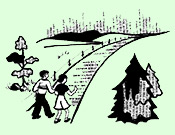
By Lois E. Wilson
As soon as we are old enough to understand, we begin to hope and wait for items and events to happen in the future. We wait for Christmas, our birthdays—to be the age to go to school, to drive, to vote, to marry, etc.
A Yiddish proverb put it this way: “It is good to hope, it’s the waiting that spoils it.”
Alexander Pope claimed, “Half the agony of living is waiting.” I put some of my views on waiting in my verse, “Observations on Waiting:”
“Throughout the soggy season we watch the green grass grow, waiting for a dry spell so we can finally mow.
At the physician’s office it’s like a train depot: patients called one-by-one, but you’re the last to go.
The shortest line at checkout is more a row of woe, for something’s sure to happen to stop its forward flow.
All through the tasty dinner, the waiter’s to and fro. But when you need your food check, where did that waiter go?
The days that we are dreading are here before we know. Those we want to come quickly; they never seem to show.
The time that we spend waiting is gone to see no more. Whether we mind the waiting depends on what it’s for.”
According to the website Brainboost.com, over one’s lifetime, the average person will spend 10 years standing in line. Other sites estimate 3-5 years and depending on a person’s time driving, it could be roughly six months waiting at traffic lights. Emerson exclaimed, “How much of human life is lost in waiting! “
Some waiting time for a special event is more acceptable and may be even enjoyable to many people. Students count the days until they graduate. It’s a rare busy bride who doesn’t count the time before her wedding.
Expectant parents await the birth of their offspring with happy anticipation. Often waiting time is welcomed for preparation for the arrival of the newborn. I’ve probably stood in line with some of you waiting to buy a gallon of milk for the family and complained about how long it was taking.
The English poet, John Milton, in a poem entitled, “On His Blindness,” says, “They also serve who only stand and wait.” He was pointing out that we all stand, wait, and serve whether incapacitated, parents of service military personnel, or those waiting on a child to finish dance class or soccer practice. Think of your waiting in that context and your answer to “Do you mind waiting?” will likely be, “No, I’m doing something important!”

